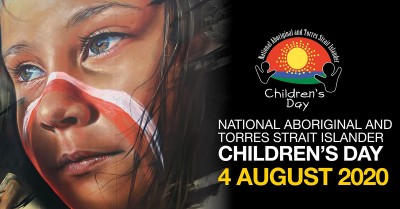On 4th August, all Australians have the opportunity to show their support for Aboriginal and Torres Strait Islander children, as well as learn about the crucial impact that culture, family and community play in the life of every Aboriginal and Torres Strait Islander child.
Activities Include:
Aboriginal Flag Handprints - The Aboriginal flag is very important to Aboriginal people all over Australia. It has been flown since the 1960s. When looking at the Aboriginal flag, there are three colours. The top half is black and represents Aboriginal people from all over Australia. The bottom half is red and represents the land Our Mother Earth. The yellow circle in the middle of both colours represents the sun - the constant giver of life.
Aboriginal and Torres Strait Islander Flags - This is a favourite activity for helping children to learn about the colours and meaning of the Aboriginal and Torres Strait Islander flags.
Basket Weaving - Aboriginal and Torres Strait Islander people weave natural materials such as long grasses, vines, plant fibres, bark, hair, fur and feathers.
Jewellery Making - Aboriginal and Torres Strait Islander People make jewellery out of natural materials, such as seeds, beans, bones, feathers and shells.
Animal Tracking - Learn to make animal tracks with your fingers.
Clap Sticks - Clap sticks are also known as music sticks or tapping sticks. They are made of various woods and decorated with burnt wire markings or paintings.
Environmental Plate - These environmental plates are great when telling Dreaming stories.
Weaving On Cardboard - Aboriginal and Torres Strait Islander People weave natural materials such as vines, bark, hair, fur and feathers.
Weaving On A Branch - Aboriginal and Torres Strait Islander people weave natural materials such as long grasses, vines, plant fibres, bark, hair, fur and feathers.
Nature Bracelet - Aboriginal and Torres Strait Islander women spend many hours gathering natural materials such as seeds, nuts, shells and flowers from the bush to make traditional jewellery.
Learn ATSI Songs and Rhymes:
Inanay - A Torres Strait Islander song about a goanna in Yorta Yorta, a language of one of Torres Strait Islander tribe in Victoria.
Taba Naba- This song is about going to the reef and is accompanied by a sit-down dance where the dancers perform traditional movements corresponding to the lyrics.
Pitjantjatjara 123 - Learn to count to 3 in Pitjantjatjara with this simple song. A dialect of the Western Desert Language, the largest language group of Aboriginal Australia.
For more activities: Activities For Children's Day
Children’s Day is a time Aboriginal and Torres Strait Islander families and communities and all Australians, celebrate the strengths and culture of our children. It is an opportunity for us to show our support for Aboriginal and Torres Strait Islander children, as well as learn about the crucial impact that culture, family and community play in the life of every Aboriginal and Torres Strait Islander child.
For more information: Celebrate Children's Day



 As an Educator in Australia, your pay rate falls under the Children’s Services Award 2010. This award states the minimum amount that an employer can
As an Educator in Australia, your pay rate falls under the Children’s Services Award 2010. This award states the minimum amount that an employer can When working as a qualified Early Childhood Teacher (with a university degree) within a service, your rate of pay will come from the Educational Services
When working as a qualified Early Childhood Teacher (with a university degree) within a service, your rate of pay will come from the Educational Services When working as a Diploma Qualified Educator your pay rate is from the Children's Services Award 2010. This Award states your minimum rate of pay
When working as a Diploma Qualified Educator your pay rate is from the Children's Services Award 2010. This Award states your minimum rate of pay When working as a Cert 3 Qualified Educator, your pay rate is from the Children's Services Award 2010. This Award states your minimum rate of
When working as a Cert 3 Qualified Educator, your pay rate is from the Children's Services Award 2010. This Award states your minimum rate of Educational Leaders play a crucial role in their early childhood service by ensuring that the educational program aligns with best practices and supports the holistic
Educational Leaders play a crucial role in their early childhood service by ensuring that the educational program aligns with best practices and supports the holistic In early childhood education and care, ratios are more than a technicality—they are a frontline safeguard. Every child deserves responsive supervision, emotional connection, and developmental
In early childhood education and care, ratios are more than a technicality—they are a frontline safeguard. Every child deserves responsive supervision, emotional connection, and developmental With the new national child safety reforms kicking in on 1 September 2025, early childhood services like yours have a real opportunity to lead the
With the new national child safety reforms kicking in on 1 September 2025, early childhood services like yours have a real opportunity to lead the Here’s a comprehensive Mobile Phone and Smart Watch Policy tailored for early childhood education and care (ECEC) services in Australia, aligned with the latest 2025
Here’s a comprehensive Mobile Phone and Smart Watch Policy tailored for early childhood education and care (ECEC) services in Australia, aligned with the latest 2025 The Sea of Fish Challenge is a national initiative that invites children, educators, families, and communities to create and display fish artworks as a symbol
The Sea of Fish Challenge is a national initiative that invites children, educators, families, and communities to create and display fish artworks as a symbol Across the early childhood education and care sector, educators are sounding the alarm: current staffing ratios are insufficient to deliver safe, meaningful, and developmentally appropriate
Across the early childhood education and care sector, educators are sounding the alarm: current staffing ratios are insufficient to deliver safe, meaningful, and developmentally appropriate


